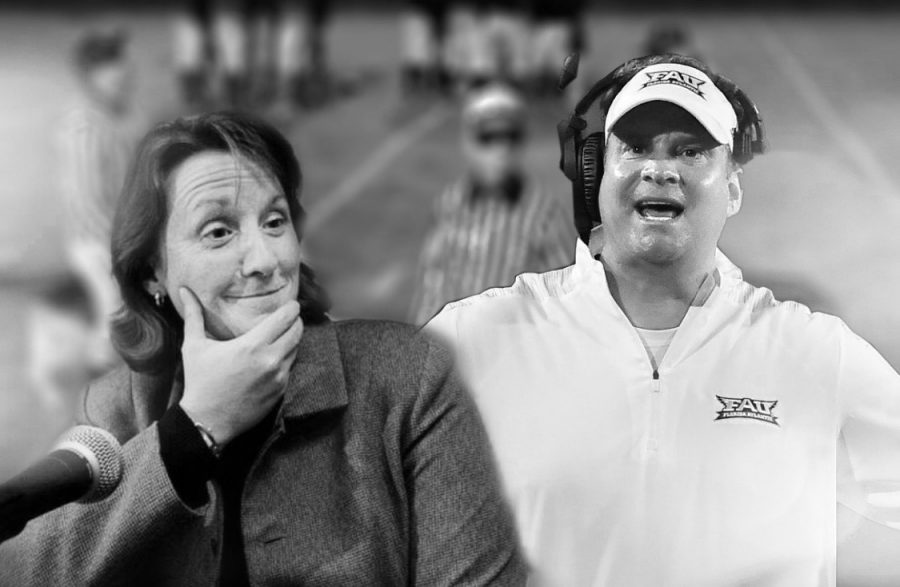Insensitive meme provokes criticism from Conference USA
ESPN / Hilltop Views Illustrations
Judy Macleod has served as the Commissioner of Conference USA for four years. Her authority should be respected by those attending the conference, including Florida Atlantic football coach Lane Kiffin.
Occasionally, sports fans are reminded of the fine line between criticism of game officials and overstepping the mark, as coaches are reprimanded and made an example of.
That was the case in college football earlier this month. In a recent storm of controversy, Florida Atlantic football coach Lane Kiffin tweeted a meme about football referees, which was met with a heavy-handed $5,000 fine from Conference USA.
Kiffin’s tweet, following his team’s 36-31 loss to Marshall on Oct. 19, was a photograph that depicted on-field officials as being blind. While this is slightly different from the more common heat-of-the-moment condemnation of referees in post-match interviews, it follows a trend. In the aftermath of fierce competition, coaches (like players) can say things they regret and are deservedly punished for.
The Conference USA publicly reprimanded Kiffin along with the fine for violating the league’s sportsmanship policy. The situation was made worse by the fact that Kiffin had taken time to reflect and still tweeted the criticism — a misdemeanor graver than merely criticizing one mistake, by one official, in one game. The Florida coach took on the whole league and hinted at incompetence in a manner which he should know not to as someone in a sporting position of authority.
The conference’s commissioner Judy MacLeod was clear with her response.
“We have an obligation to enforce our rules, including the prohibition of public criticism of officiating,” MacLeod said.
Ultimately, punishment is the right action on the league’s behalf. If there were no consequences, coaches could get away with public criticism, and they shouldn’t be able to post whatever they want with no consequences. Coaches have a responsibility to adhere to the same standards they expect of their players. On the other hand, sports conferences reserve the right to fine members who criticize the organization.
Kiffin responded to the fine by arguing that he should have freedom of speech within the boundaries of the conference. However, this doesn’t serve as a violation of free speech, rather a violation of unspoken rules of sportsmanship and respect.
Kiffin later told ESPN, “We have freedom of speech, but I guess around here there’s no such thing as freedom to tweet.”
The perception of Twitter as a free-for-all platform in which punishment doesn’t apply is naïve.
As a coach, emotions run high, regretful comments are made and often sporting fans are able to empathize with frustration, particularly if their team is on the wrong end of refereeing mistakes or bad calls. Regardless, freedom of speech only goes so far; the conference couldn’t simply let Kiffin’s comments pass.
Fines aren’t necessarily the best means of punishment though. The monetary punishment is unlikely to hit the coach themselves — rather the team’s hierarchy who pay the fines for them — and therefore don’t serve as enough of a deterrent.
Coaches will always say how they feel in the heat of the moment or shortly after. While fines may not be the right punishment, strong action certainly is. Freedom of speech is simply not an excuse for comments such as Kiffin’s, which serve as a possibility for bringing the sport into disrepute and undermining critical values such as integrity.

Hi! I am George Murray, one of the Sports Editors at Hilltop Views. I am an english literature major and journalism & digital media minor graduating...







